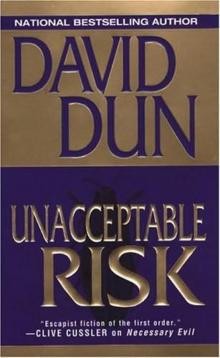Unacceptable Risk Read online
Page 5
"You said Benoit Moreau nicknamed the substance Chaperone. Come on, Figgy. Tell me everything."
Figgy shrugged. "I'll tell you what I know, but my client won't like it. Essentially, Benoit Moreau is not talking, although she has told us a few things and we have gotten other information from Northern Lights." Figgy took a sip of coffee. "As you might suspect, Benoit knew all the scientists. One or more of the scientists obviously understood Chaperone. Benoit knows which ones, maybe even where to find them."
Sam stood and drew a cup of coffee. "Come on, Figgy, there's got to be more."
"I'm getting to it. Northern Lights Pharmaceuticals supplied Grace with a complex protein molecule. They won't admit it, but we can now assume the material came from their client Michael Bowden. They haven't been able to fully analyze or describe the molecule yet. This is apparently typical of complex proteins—it can take a very long time. Synthesizing them is a bitch, and before you can even hope to do that, you have to figure out what it looks like or you have to know the gene that produces it. To some extent, Grace Technologies seems to have lucked into the Chaperone solution. They ordered an extract from Northern Lights, expecting an ordinary immunosuppressant like cyclosporine. It turned out to be about one thousand times more powerful and better suited to the brain in particular. It took some work, but Grace adapted it through some sort of chemical process that nobody we know understands. Instead of just temporarily suppressing the immune system, it seemingly reprograms it entirely. Nobody who's talking has any idea how that works."
Sam smiled. "And Northern Lights is fresh out of the Chaperone molecule, right?"
"Grace bought it all for a tremendous amount of cash. Bowden must know where to get more. His kind would never take all of a species. Presumably, Gaudet realizes this. So now it's an old-fashioned footrace to the Amazon. The French are willing to let you contact Bowden if you'll sign me up for your little program."
"It's a free country. I can contact Bowden anytime I wish."
"Look, Sam, the CIA owes us and they promised us we're in. And you need Benoit Moreau."
"Figgy, I know the French have influence on this, but I don't know why. Maybe they saved some poor soul that the U.S. government thought needed saving. And I see who pays my bills, so I do listen with at least one ear. But it wouldn't be the first time that I've said no to our beloved government."
"Do we have a deal, Sam?"
"Only for old times' sake, Figgy. But I'll need full cooperation and full disclosure."
"Good." Figgy held out his hand and Sam shook it. "Full cooperation guaranteed. I've gotta get on a conference call, but could I first use the latrine?"
"Sure. But to make this deal, I need to ask you one thing: when you talk to your client, ask if they'll arrange for me to talk with Benoit."
"You sure you want to meet the dominatrix herself?"
Sam's expression provided his answer.
"Sure. You bet. I'll ask," Figgy responded.
"Okay. To get to the restroom you go out of here, past Big Brain through the door, and down the hall to the right. If you find the dorm rooms, you've gone too far."
"Don't do anything exciting until I get back." The big man took a last look at the food spread, chose a soda, and walked out.
""You didn't mention anything about this Georges Raval," Jill said after Figgy was out of earshot.
Sam smiled at her, his usual way of saying there would be no discussion. "Let's talk about Michael Bowden." He turned to Grady. "What did you find?"
"Didn't you want me to brief Figgy at the same time?"
Sam gave her that smile again.
"You don't trust him, do you?" she asked.
"I trust him fine," Sam said. "But there's no sense in testing human nature when there's this much at stake."
Chapter 3
Bad spirits bring their own kind.
—Tilok proverb
Jean-Baptiste Sourriaux, occasionally called by his childhood nickname of le souris, "the mouse," listened to the tick of the gold clock that sat on his mahogany side table. The clock had been a gift from his wife, subtly intended to get him home on time. On this night, as most, it did no good.
Baptiste was a tall man and thin, in fairly decent shape. He had no striking features, only a high forehead leading to a nose that slanted downward so that the tip hung a little below the nostrils. He spoke crisply, more in the fashion of an Englishman than a Frenchman. His colleagues claimed he had no sense of humor, but he knew he had humor, he just kept it to himself. Besides, France was going to hell and no one was doing anything about it. It was all liberal these days and no one cared that the ghetto people were becoming lawless and propagating like rats and had nothing but contempt for their adopted country and her ways. His offices were on the Boulevard Mortier in the 20th Arrondissement in the Caserne des Tourelles; that meant that anybody who knew anything knew he was an intelligence officer (known collectively as honorables correspondents) when he walked in the building every morning.
His office was small, despite the fact that he reported directly to Admiral Larive, the head of the SDECE. It was the spook branch of the French government and was comprised of career military officers and assorted civilians. Baptiste, roughly the equivalent of a major in the U.S. Army, called Command and, but for the "special assignment" of personal interest to the prime minister, would have reported to a colonel. He expected to retire with the same rank, since he was already forty-eight years old and had no promotion in sight.
Field agents never got much in the way of an office, normally just a cubbyhole with a divider, because they weren't expected to spend much time sitting in them. Because of his special assignment, however, Baptiste had been spending a lot of time here. At the moment he was pondering the biggest issue of his career and waiting for a vital phone call.
Finally the phone rang.
"Yes?" Baptiste struggled to maintain his usual flat calm.
"We are in."
"For sure."
"Yes."
"They believe you?"
"The main man does. Others may be skeptical."
"What are you drinking?"
"A soft drink. Why?"
"Can we use the computer instead?"
Baptiste's hired agent Figgy Meeks could download a cipher code from the SDECE for his communications, each code lasting only forty-eight hours. Baptiste waited for his own download of the current cipher. In seconds the written text appeared on his screen; now written dialogue was possible, and it could be kept on file for future reference.
"They are going after Bowden. I will stay in the States. They don't seem to know about Paul. Attribute it to Gaudet. They wonder, as I do, why Gaudet would risk using the vector against Sam's neighbors."
Baptiste replied:
"I have no idea. It has gotten the attention of American intelligence. They will be looking harder. That means we redouble our efforts... And remember: It was an accident. You bear no moral responsibility for Sam's man."
"That's wishful fantasy."
"You know how to count $5,000,000.00? "
"Remind me again that I'm doing this for money and I may cross the ocean and shove it up your ass," Figgy communicated.
"Next report when? "
"When I know something worthwhile. Have you learned anything more from Moreau? "
"They are working on it. Nothing yet."
"Sam wants to talk with her ASAP'
"No chance. As to Bowden.... Where is he, exactly? When are they leaving? " Baptiste prodded.
"No intel on that yet."
"Remember that you are working for the French government and are handsomely paid. Get me that information."
Figgy's transmission died. Like all American government men, Meeks was a prick. At least he was a greedy prick who had been screwed over by the CIA in a fashion similar to what the French government was doing to Baptiste.
Baptiste thought carefully about his next move. It would be dangerous not to run it through channel
s. He called the admiral and amazingly got him on the first ring.
"I'm about to run," the admiral snapped.
"We have a situation in the Amazon. The Americans feel—"
"Yes, yes. You told me. A man named Bowden supplied Northern Lights and perhaps Chaperone came through him. You have my permission to shadow the Americans. Who will you send?"
"Rene Denard," Baptiste replied.
"A bit of a renegade, don't you think?"
"We need someone strong."
"Tell him not to cross swords with the Americans." The admiral rang off.
"I need Bowden or Raval." Devan Gaudet spoke in French to Trotsky, his assistant, who sat on the other side of the coffee table in a rented house in Mexico, not far south of the California border. "Ideally both. I'll need better men than those who went after Sam and I'll need better men than those who went to South America last time. I don't like losing."
Men were finishing up with the boxes and loading them out the door into a truck. Most of the stuff was staying and would go up in flames when the small house burned to the ground. After everyone had departed, Trotsky would open the propane line—it would make for a fast, hot fire.
Angelina, a Mexican woman who had been tending the home for several months, was cleaning behind the movers. Even though Gaudet had spent little time here, his fastidious nature required a housekeeper.
"The team is coming together," said Trotsky. "You needn't worry. They'll be up to the job."
Gaudet's thin lips were pursed white in a rare display of emotion. "I am worried. We looked like asses in front of our investors." Gaudet closed his eyes as he forced the thought from his mind. "Let's review the video."
Trotsky turned on the TV A huge auto parts store and fenced lot flashed on the screen.
"Sam's offices are in the back, behind the tall brick wall. There's cut glass on top of the wall and those signs you see are posting a warning. It's got tight security and it's no doubt a bomb-hardened structure." Trotsky glanced at the maid.
"She is fine," Gaudet said. "She barely speaks English, much less French."
"Sam is like any other man. He can be killed."
Gaudet did not reply. He stared at Trotsky until he shifted in his chair and turned to the movers.
"Shove off," Trotsky told the men, who hurried to leave with the last of the boxes.
From outside, Gaudet heard the big diesel engine of the transport truck. "Angelina"—Gaudet thought through his request in Spanish and did the best he could— "Puedes cortar esa Guayavay trerme la aqui, por favor? "
Saying nothing, the maid went to the corner of the kitchen and removed a guava from a burlap sack. Using the knife, she skillfully cut it up and brought it on a plate. "You may have one as well," Gaudet said.
"Gracias, no."
"I insist," Gaudet said.
Angelina shrugged, took a slice, and began eating as though she had had a secret desire. Trotsky ate as well. Gaudet picked up a slice and held it while he spoke in French. "So as long as Sam is alive, he is the single greatest threat to our plan." He stopped the videotape. "But I'm out of time at this moment. Bowden is all that matters now. Later this video will come in handy."
Trotsky walked over to the TV inserting a second video. Gaudet rose to pour two glasses of port while he watched Angelina out of the corner of his eye. Suddenly she swayed on her feet, grabbed the counter, then collapsed to the floor and began convulsing. Trotsky whirled and saw Gaudet still holding his slice of guava. Gaudet gave Trotsky a slight smile, enjoying his little joke. Trotsky looked uncertain, a little panicked.
Slowly Gaudet lifted the guava slice to his lips and took a robust bite. Trotsky's shoulders dropped and relief washed his face.
"It was only a catalyst in the guava," Gaudet told him. "I poisoned her earlier. For you and me, the catalyst is harmless. For Angelina, it will look like a heart attack. Nonetheless, make sure the fire burns hot."
Chapter 4
Cleverness in an evil man is like fire in the treetops.
—Tilok proverb
Her green eyes could have been taken directly from Mother Amazon.
Michael Bowden always felt Marita's presence before seeing the bronze of her skin catch the light. She appeared infrequently and always silently. Michael fancied her a creature of the forest, a shadow in the green, but knew there was more to her. She would reveal that aspect, or not, in her own time.
The informal alliance had been formed from the smallest subtleties over many days, though they had never been closer to one another than about twelve feet. On certain days she would come right to the railing of the large porch, though her favorite place seemed to be the giant ficus tree, where she'd perch among the vines that wrapped the limbs like braided rope. He had been preparing to draw a map for a book when he'd first noticed Marita on this hot, muggy afternoon. She had come much earlier than usual. From the expression on her face he knew instantly that something was different. Perhaps she was troubled. He would be patient, keep on with his work, and let her settle in. Maybe today they would talk.
Built on massive stilts, the entire house, including the porch, stood some eight feet off the ground, a measure taken against the coming wet season. In Peru, in the vast jungle province of Loreto, two great rivers, the Maranon and the Ucayali, came together to form the Amazon—unless you were a Brazilian citizen and then the Amazon was said to be formed by a downstream confluence that was, not surprisingly, in Brazil. Between the Maranon and the Ucayali lay the 5-million-acre lowland reserve Pacaya-Samiria. Only 1 percent of the reserve remained terra firma during the wet season. In fact, during the annual high water, from December through June, 80 percent of the Loreto Province (if you didn't count trees and floating grass mats) lay underwater.
To the south of the Ucayali the local people, called the Matses, used stilted huts near the river to weather the wet season. Historically, they had been nomadic and among the most skilled hunters of the Amazon. In modern times they remained among the more remote of the indigenous natives of Peru and Brazil, although they had been influenced by Western missionaries since the 1970s, and they had been exposed to Western culture more than the other tribes across the border in the Brazilian refuge.
Marita was Matses, though she lacked the tattoos or nose piercings common to Matses women. Westerners called the Matses "cat people" because of whiskerlike wooden pieces that the women wore in their noses as a matter of course and that men donned during special celebrations.
Michael wasn't sure what language Marita spoke, but he had heard that she had been away to school. He was fluent in both Spanish, the official language of Peru, and Portuguese, Brazil's dominant tongue.
It had been months since Michael had been with a woman— not since his wife died—but, for him, Marita's seductive light was cast by much more than her sexuality, although that too seemed considerable.
She had come out of the vines and stood on the ground where he could clearly see her, but where she could not see his work. That alone was different.
He felt he should continue with his map, let her decide whether to come closer. The map concerned a group of animals (people thought of them as plants) that he believed were closely related to a saltwater sponge—in this case a previously unknown freshwater species. He'd found them during a ten-day walk, Matses time, through the jungle and across the Yavari, into Brazil, where Matses had led him to another tribe that in turn led him to a quebrada, or small, deep, black-water river. Michael suspected that like some saltwater sponges, these might have anti-inflammatory or immunosuppressant properties. Shamans from this deep jungle tribe in Brazil had used an extract from the animal, mixed with four other plant extracts, to heal what had appeared to be neurological disorders that seemed to Michael like MS. Most noteworthy, however, was the fact that such cures were an apparent medical impossibility using conventional therapy. In his own mind there was most definitely some rational explanation for this anecdotal information because the laws of nature were the laws of s
cience, and the laws of science were ultimately the laws of the universe. It was up to the scientist to make the reconciliation between seeming conflicts. Some of this animal and plant material had been submitted to the pharmaceutical company and they were begging for more, though he had no idea why.
Returning to the site of a prior discovery was easy these days, thanks to the handheld GPS. Still, he wanted a good hand-drawn map, if not for actual use, then for his forthcoming book. A map would make the tale of the discovery of the sponges more vivid and exciting for the readers. Since the reserve was strictly regulated with a prohibition against visitors and very remote, it was unlikely that an estranjeiro would try on his own to follow the map. As a final precaution Michael deliberately did not draw the map to scale.
A table of pine that had belonged to his grandfather, and had been brought from the United States up the Amazon River, supported his work. A stack of notebooks, blue in color and nicely bound, stood on one corner. Directly in front of him was a computer that sucked up its power from batteries that were recharged by a diesel generator. At one time he had thought of the generator as a vile intrusion on the jungle, but now he wasn't sure. A second, much longer table formed an L with the computer desk; on it were the Bunsen burners with clay pots, retorts, glass tubing, beakers, and various other laboratory items. Michael sometimes used modern conveniences in reproducing the concoctions of the shamans, but he often found it was best to use their methods and their materials at least the first time.
Michael looked up from his work: Marita had come to the bottom of the steps. She held something ... a book—intriguing. When he held up his paper and beckoned her closer, she seemed to ponder the idea instead of fleeing. He lowered his eyes, waiting to see what would happen next.

 Overfall sw-1
Overfall sw-1 Unacceptable Risk
Unacceptable Risk At The Edge
At The Edge Unacceptable Risk sw-2
Unacceptable Risk sw-2 Overfall
Overfall The Black Silent
The Black Silent